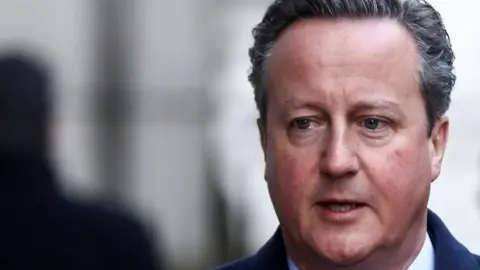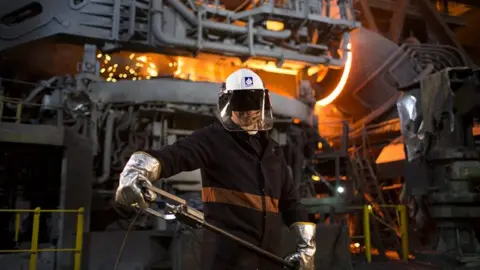Greensill: Cameron asked to give evidence at MPs' lobbying inquiry
 Reuters
ReutersFormer Prime Minister David Cameron has been invited to give evidence at the Treasury Committee's inquiry into the collapse of financial firm Greensill.
It is also examining how the Treasury responded to lobbying on behalf of the company - including from Mr Cameron.
Committee Chair Mel Stride told the BBC he would also ask firm founder Lex Greensill and Chancellor Rishi Sunak to appear at the inquiry.
Mr Cameron has said he will "respond positively" to requests for evidence.
The demise of Greensill has put steel jobs at risk and triggered a row over the amount of access the company had to those inside government.
Mr Cameron, who started working for Greensill Capital in 2018, texted Mr Sunak asking him to include the company in a Covid-related government loan scheme.
He also met Health Secretary Matt Hancock for a "private drink" in 2019 to discuss a new payment scheme for NHS staff, run by Greensill.
The ex-PM has said he did not break rules on lobbying - attempts to influence government policy.
It also emerged that Bill Crothers, a former senior civil servant, joined Greensill as an adviser in 2015 despite still working for the government.
Mr Crothers says his role had been approved by the Cabinet Office under its internal conflicts of interest policy.
Following the revelations, a number of inquiries have been launched, including one by Boris Johnson examining how businesses engage with the government.
Mr Johnson said his party had been "consistently tough on lobbying" but Labour said the Greensill affair revealed the "sleaze and cronyism" at the "heart" of the Conservative Party.
 Liberty Steel
Liberty SteelSpeaking to the BBC's Today programme, Mr Stride said his committee wanted to "reassure ourselves that the Treasury responded appropriately at every stage to the lobbying it was the subject of in respect of Greensill - particularly in the case of David Cameron".
In his letter to the former prime minister, Mr Stride has asked Mr Cameron to provide details of his contact with the Treasury, including the texts he sent to the chancellor.
Writing to Mr Sunak, Mr Stride asked for an estimate of the Treasury resources that went into assessing which government loans Greensill could access and how that compared to other companies
And the committee chair has said he wants to see any informal or formal complaints or concerns raised by Treasury staff into work being undertaken on Greensill.
Mr Stride told the BBC his committee was also interested in the regulatory lessons surrounding the collapse of Greensill, noting that, unlike standard banks, these type of companies - sometimes known as shadow banks - have no requirement to hold capital reserves.
Greensill collapsed in March 2021 when one of its insurance companies withdrew protection for some investors.
This had a knock-on effect for Liberty - Britain's third-largest steel producer - who were backed by the specialist bank.
